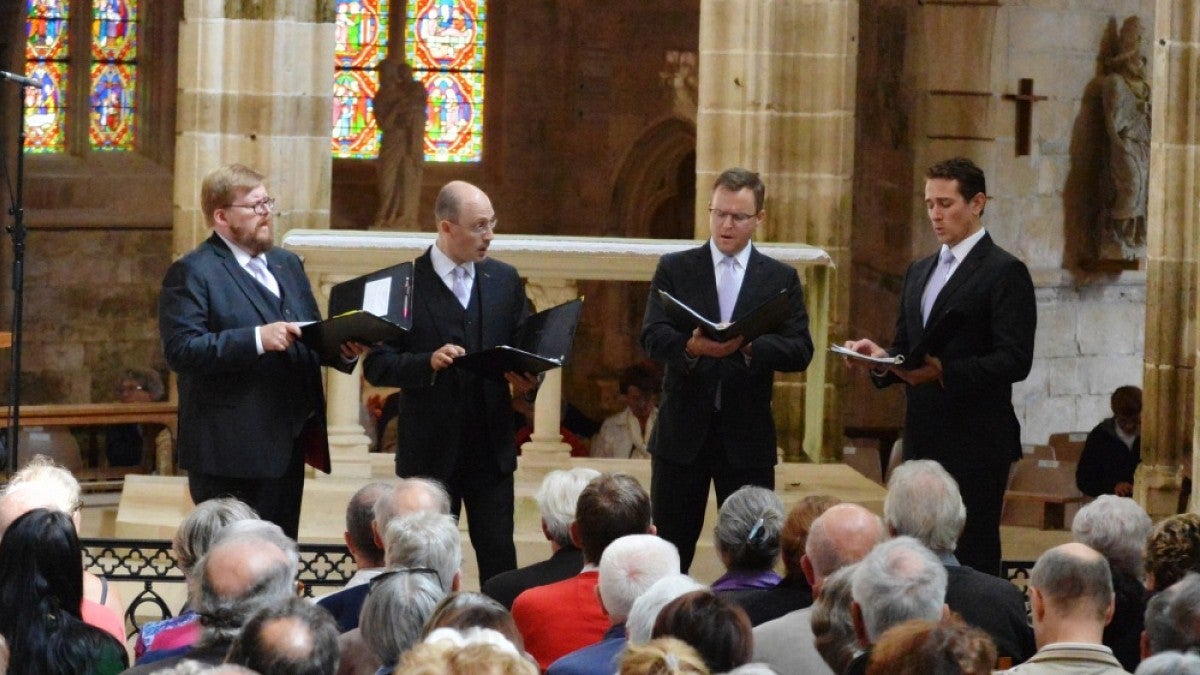UO assistant professor of voice Craig Phillips was watching a documentary about the 150th anniversary of the publication of Charles Darwin’s “On the Origin of Species” when he had a lightbulb moment of his own.
The narrator had just described Darwin’s landmark work as the most influential book since the bible. It was a passing reference, but it gave Phillips an out-of-the-box idea for a creative project involving his chamber ensemble New York Polyphony, a two-time Grammy-nominated vocal quartet that specialized in rare Renaissance and medieval music.

He stayed up late into the night reading some of Darwin’s most famous works, including “The Descent of Man” and a collection of his correspondence, and became convinced that Darwin’s lyrical and poetic writing would lend itself to the ornate musical style.
Then, the next morning, he reached out to composer Gregory W. Brown to see if he was interested in collaborating on a piece of music that would set the words of Charles Darwin in the traditional musical form of a Roman Catholic Mass.
Brown said he was immediately intrigued.
“I usually call myself an agnostic or a nonbeliever,” Brown said. “It felt dishonest for me to write a liturgical Mass, so when Craig brought this idea my way, it seemed like just a really good fit for me to be able to write a Mass, and have it be a secular Mass — a Mass that was centered around this scientist for whom I had a lot of respect, and as I got to know the texts more and more, a lot of respect for his writing as well.”
Brown was intent on incorporating some of Darwin’s key theories into his composition.
He used a DNA sequence from one of the species of finches that Darwin encountered on his famous journey to the Galapagos Islands as the inspiration for the opening movement, assigning each of the four nucleobases from the genetic code to one of four corresponding pitches.
He also used other ideas from genetics, including mutation, addition and deletion, as well as traditional musical inversion of the main theme to morph it into new forms within the Credo.
The DNA-based melody and its variations appear in a number of places throughout the 25-minute “Missa Charles Darwin” — Latin for The Charles Darwin Mass.
His brother Dan Brown, author of the popular “The Da Vinci Code” and “Inferno” novels, was in the audience for an early performance.
It wasn’t until several years later that the author told his brother that “Missa Charles Darwin” and the ideas behind it had inspired the next novel in his bestselling book series, featuring fictional Harvard professor of symbology and religious iconology Robert Langdon.
“In the past, my novels have all come from things I’ve read,” the author said in an on-camera interview about his latest novel, “Origin,” which was released Oct. 3. “This particular novel came from something I heard, a piece of classical music called the ‘Missa Charles Darwin,’ which had as its text the writings of Charles Darwin, this fusion of science and religion, which is a recurring theme of mine.”
And the music was more than just inspiration for “Origin.” It also became a plot point in its own right, with the hero Robert Langdon encountering a recording of “Missa Charles Darwin” as the novel hurtles towards its climax.
“It never dawned on me that it might make it into one of his books,” Gregory Brown said. “That was a surprise to me. It’s an honor.”
To coincide with the release of “Origin,” Parma Recordings has created a special box set with a remastered CD recording of “Missa Charles Darwin.”
Proceeds from sales of the box set will go to musical education charities including Chorus America, American Choral Directors Association and the International Society for Music Education.
In the meantime, Phillips and his group New York Polyphony have been performing the piece in venues around the world.
“We wanted this to end up in what we call secular places of worship: museum spaces, gallery spaces, library spaces,” Phillips said.
His favorite performance so far was at the Museum of Natural History in Berlin, where Darwin’s great-great-granddaughter, biologist Sarah Darwin, gave a personal introduction.
“Darwin loved music,” she said. “He even said it sent shivers up his spine when he listened to it.”
One of the reasons Darwin chose to marry his cousin Emma Wedgwood was that she was an excellent piano player, who had even taken a few lessons from celebrated composer and piano virtuoso Frédéric Chopin, she said.
But, despite his love of music, “Charles, we think, was actually tone deaf,” she said.
“And so of course, in his usual fashion, he used this information to look at inheritance. He looked at which (of his own) children had inherited this musical skill and which had not. Without inheritance, evolution by natural selection doesn’t work.”
Charles Darwin believed that musical ability was an important component of sexual selection, at least among humans.
“I conclude that musical notes and rhythm were first acquired by the male or the female progenitors of mankind for the sake of charming the opposite sex,” Darwin wrote in “The Descent of Man.”
Some Christian groups have attacked Darwin’s theory of evolution ever since its publication more than a century ago because many believed it directly undermined their belief that God created the world. Phillips said he realized that injecting Charles Darwin’s theories into one of the Catholic Church’s most sacred ceremonies was likely to be a controversial concept.
But so far the work has received more pushback from scientists than from Christians, he said.
“This was not intended to be controversial for controversy’s sake,” Phillips said. “We wanted to start a conversation.”
During a presentation at a TEDx event, an audience member from the scientific community noted that Darwin himself never intended his theory of evolution to become a religious belief system of its own, Phillips said.
“We have had church presenters request this piece, I would say, more than traditional concert presenters,” Phillips said.
Phillips said he hoped to continue touring the thought-provoking piece with New York Polyphony.
“There’s a conversation to be had and I think we’re only just starting it.”
Watch New York Polyphony record the traditional Kyrie (Latin translation: “Lord, have mercy”) section from “Missa Charles Darwin” here.
—By Steve Fyffe, School of Music and Dance


